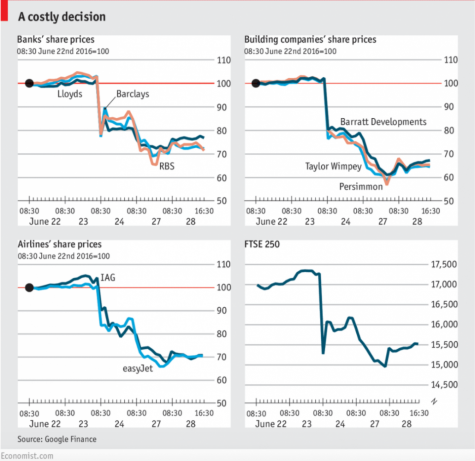Frexit
May 2, 2017
The 2016 United States election result was the catalyst of two very different reactions: either euphoric delight and hope from Trump supporters, or utter dismay and fear from, well, everyone else.
The French may go through a very similar clash of emotion. The campaign for their next president is underway and so far they have whittled the candidates down from eleven to two. By all accounts, the remaining competitors are polar opposites on the political spectrum. The young Emmanuel Macron used to be an economy minister and has a noticeably centrist regime. The alternate candidate, Marine Le Pen, is vastly different. She has a far-right political view, and, following in the footsteps of her father, has served competently as president of the National Front (a right-wing nationalist party). So, why is the French election relevant? Le Pen, like Trump, is yet another populist candidate who appeals to the ordinary civilians who make up the bulk of the population. She was even verbally endorsed by Trump. Le Pen is running her campaign on a France First ideology (does that echo ‘Make America Great Again?’), depicting Macron as unpatriotic. Her populist promise of putting France at the forefront of her efforts indicates some severe alterations. Among her objectives are an expulsion of illegal immigrants, while cutting the allowance of incoming immigrants to accepting 10,000 people per year. In addition, she hopes to shut down “extremist mosques.” Evidently, not the most racially accepting of people. However, the most controversial goal of Le Pen’s is to follow in the footsteps of Britain’s withdrawal of the European Union (Brexit). Critics have labeled this goal “Frexit,” a twist on Brexit. The following clamor of this announcement splashed all across Europe, goading political leaders from other countries to pine in on the French election in the first example of outside countries voicing their opinions on another country’s politics in years. Endorsements have been flying at Macron from all over the continent in hopes that he’ll keep the EU from becoming even more fragmented.
What Will Whitman Feel?
Although the election is taking place in a country across the sea and the EU is a union from across the Atlantic, the potential impact of Frexit (and the election of a populist president in Europe) would be felt globally, including at Whitman. Based on Brexit, the most widespread impact would be on the global market (as indicated by the graph). Stocks across the globe crashed like a landslide as investors pulled out of risky exchanges and played it safe. By taking out yet another pivotal piece of the EU market, the structural integrity of the EU will be put in question. Thus the exit of France would catalyze the fearful reactions exhibited during Brexit but on a whole new level.
In addition, the possibility of Le Pen being elected would be a statement as to the success of racist/nationalistic populism. With her and President Trump both standing in opposition to immigrants, the illegal immigrants everywhere must fear for their well-being. Whitman is home to undocumented students, and the populist revolution would go against the sanctuary-campus environment that is so carefully fostered here. A victory of Le Pen, as well as Trump’s recent (and as of yet unsuccessful) battle against sanctuary cities, would not help the mental health and security of undocumented students, nor those on campus with family members who have an illegal immigrant status.






